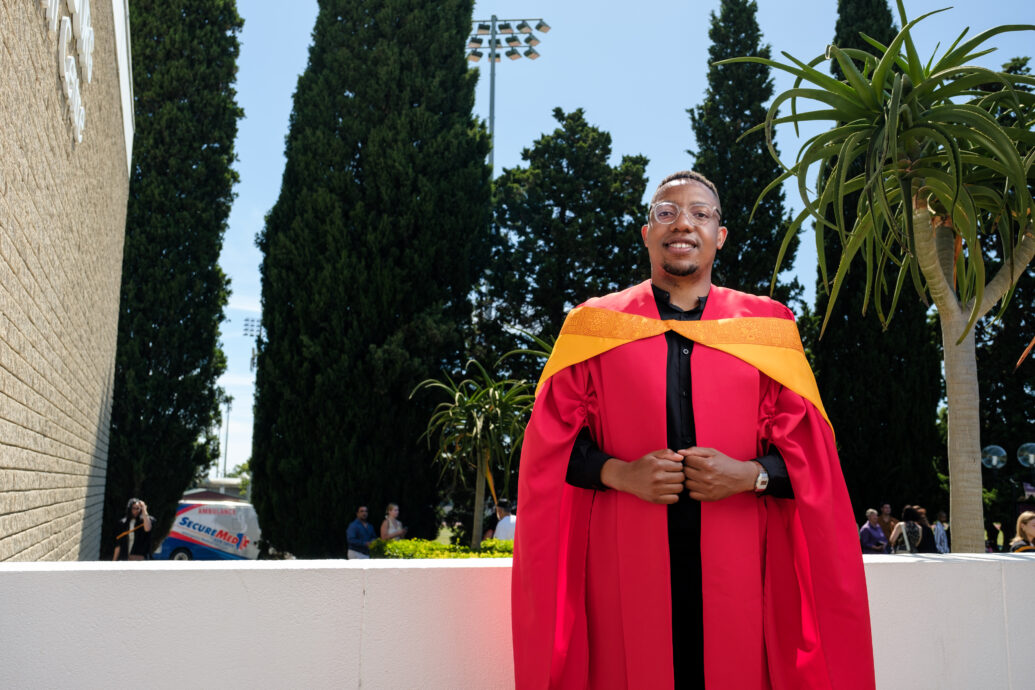Laura Mutyambizi

All the way from Zimbabwe, Bongani Tendai Percy Mashange is the first Visual Arts student in Stellenbosch University to upgrade his master’s dissertation to a PhD. Mashange’s focus was on contemporary jewellery that explores the different forms of African identity, but at the core of it, his own.
Mashange explained that he had never initially considered jewellery design, as he was searching for a degree that involved anything to do with the Arts. Ultimately, he began his journey in jewellery design at Stellenbosch University. Mashange states that there was a sense of shock and disbelief that he was doing jewelry design as a black man from Zimbabwe, indicating that it is not quite the diversified field it appears to be.
However, Mashange says “as the years progressed [he] began to love the degree. It was fun and it was different, and it helped [him] grow as a person.” And this has ultimately led him to an unexpected dream which would allow him to discover and fully understand his identity as an African.
Mashange’s research delves into the complexities of his African identity as “Ndebele and Shona, Zimbabwean by nationality and a resident of South Africa – an African soul.” This is the meaning behind the title of his research – “An Afropolitan quest.” through the lens of art jewellery, he depicts both a personal and collective narrative of his African identity as he had to navigate being both Ndebele and Shona. “Jewelry transcends mere accessory status; it is a profound expression of identity, heritage, tradition, social status, intertwining tradition and modernity,” said Mashange. Although Mashange’s work has been classified as art jewellery, he states that it “often resembles non-functional sculpture, prioritizing aesthetics over representational or narrative elements.” He further states that “understanding [his] own identity is a crucial part to comprehending [his] work.”
Mashange states that the aesthetic of his jewellery is inspired by “Zimbabwe’s material culture such as wood carvings, stone carvings and sculptures.” Whilst growing up in Zimbabwe, he observed that there was a horrible perception that sculpture made by black people was “primitive” because of the techniques used and he aimed to understand why that is and change the narrative by using “[his] politics and subjectivity to shift the negative narrative into something celebratory”. Additionally, he wanted to highlight the positivity of being both Shona and Ndebele, despite the history of ethnic divide in the country. Using wood, which was perceived as extremely primitive, and incorporating different techniques from different parts of the world, Mashange demonstrates the holistic nature of his African identity and recognizes that he is a global citizen as well. Therefore, his work both celebrates and acknowledges the complexities of African identity, both personally and collectively.
The main focus of Mashange’s work is that it “examines identity within postcolonial Africa, focusing on belonging within the framework of the nation-state” through the perspective of a black Zimbabwean navigating diasporic and transnational experiences.
After graduating last year, he was awarded a Consolidoc fellowship by SU, which is a program that involves writing articles from doctoral research for a few months. SU has offered him funding so he can convert a chapter in his thesis into an article, and produce three works from it. Once he is done, his work will be displayed at an art gallery of the faculty’s choosing. Die Matie is looking forward to seeing what Dr Mashange will do next and hopes that SU will continue to reward his good efforts.



